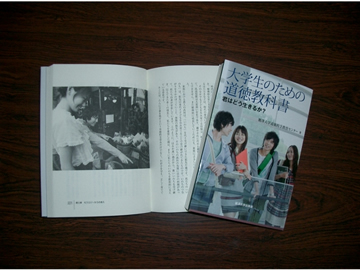Moral Textbook for University Students completed!
As you are all aware, this year marks Reitaku University’s 50th anniversary, with numerous commemorative events and projects scheduled. We are happy to announce the completion of one such project, the publication of the Moral Textbook for University Students — How Do You Live Your Life? by the Center for Moral Science and Education on April 1. It is the textbook for our core general education subject “Moral Science” of Reitaku University, aimed at enhancing students’ understanding on the university’s founding philosophy. After the entrance ceremony on April 2, freshmen will start using the new textbook in class. We anxiously look forward to hearing about what they think of the new study material.
We are proud to have produced what we believe is the first attempt in tertiary education to provide a textbook on morality. Of course, there are textbooks on ethics and religious studies, but to our knowledge, this is the only university textbook that directly and academically examines morality.
In general, it is university teachers who write university textbooks. When it comes to themes like “morality” in particular, the textbooks tends to become one-directional, holier-than-thou preaching. This textbook, however, has incorporated “student perspectives” as much as possible so that it does not become just another dogmatic book on morality. Specifically, we compiled the book via the following procedure: First, we called on students who studied “Moral Science” to become “monitors”, divided them into groups, and allocated different sections of the previous textbook Introduction to Moral Science (FY2008) to each of the groups to study. This is so that all students had time to examine their assigned sections closely, and identify any questions or issues in advance. In the workshop that followed, each group was accompanied by teachers as they thoroughly scrutinized and discussed the material, down to the last detail.
Since each workshop required substantial amounts of time, it was scheduled on days when there were no classes. While the workshops were a full-day affair, there was not a hint of tiredness or resignation. In fact, the sessions were so fulfilling that time seemed over as soon as they had begun. The sentiment was shared among the participating students, who praised the workshops for providing intellectual stimulation and fulfillment.
The final workshop was held as an overnight camp at Tanigawa Seminar House of Reitaku University in Minakami Township, Gunma Prefecture, in order to re-examine the first draft of the new textbook. The facility has a hot-spring spa, opened in 1937 by our founder Chikuro Hiroike. Being a physically frail man, he had visited over 90 hot springs with health benefits, and chose this site as a healing facility to help people stay healthy. The picturesque natural environment and full spa facilities motivated intellectual activity and helping us reconnect with his founding philosophy and theories on morality. Needless to say, the workshop was a great success (See CMSE Website for details). In brief, this textbook is the product of collaboration between teachers and students.
From the time of its conceptualization, the textbook took exactly one year to complete. The fact that it took shape in a relatively short period of time is attributable to the existence of the “Introduction to Moral Science”, the precursor to our current textbook. It contained a wealth of information and formed the foundation of the new one.
The endeavors of the Center for Moral Science and Education do not end with the publication of the textbook. It is an edition that focuses on theory, and it could be followed on with another textbook for university students about the practical implementation of morality in real life. In addition to regular classes, Reitaku University provides students with a range of opportunities for self-discovery and self-improvement, such as student support activities (dorm manager seminars/leader seminars), extracurricular activities on and off campus, collaboration with local communities, and study-abroad programs. Try reviewing the first-hand experiences gained there from the perspective of morality, and finding the meaning in them? While the current textbook has been written mainly by teachers having charge of the “Moral Science” class, why not collaborate with overseas universities that have a similar level of focus on moral education as Reitaku, and jointly develop a textbook that actively incorporates international perspectives, amidst demand in society for globalization in university education? There are no boundaries to our dreams and visions.
※Moral Textbook for University Students is published by Reitaku University Press and is available for 1,500 yen (excluding tax) from April 9, 2009.
See the Reitaku University Press website (http://www.rup.reitaku.jp/) for more details (to be updated on April 10).

The New Textbook, Moral Textbook for University Students



